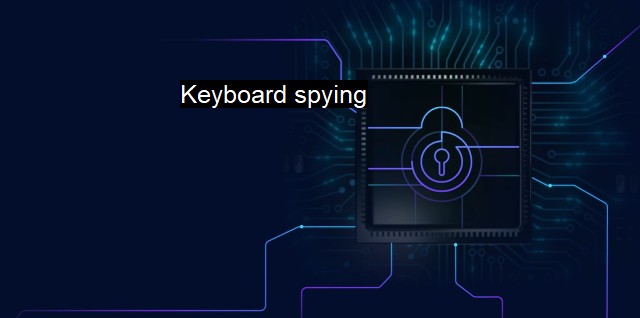What is Keyboard spying?
Keyboard Spying: A Stealthy Threat in Today's Cyber World and Its Implications for Cybersecurity and Antivirus Solutions
Keyboard spying, colloquially known as keylogging, serves as a significant topic in the context of cybersecurity and antivirus development. This threat represents a prevalent and commonly used hacking technique that malicious individuals deploy to deploy harmful software or engage in cybercriminal activities.Typically, keyboard spying involves parties intercepting and recording keystrokes on a person's computer or smartphone without their permission or knowledge. The captured data can provide a plethora of sensitive information such as login credentials, credit card numbers, personal messages, and any other data that individuals key in when using a computing device.
Keyboard spying can happen in a number of ways. A common method involves the introduction of spyware, often in the form of a software that secretly installs onto a device. Once installed, this software records every keystroke made on the device and subsequently sends the recorded data to a remote server where the cybercriminal access it.
Another prevalent keyboard spying method is hardware keyloggers. These physical devices are attached in between the keyboard and the computer, where they record all data transmitted through the wires unnoticed.
Looking at the cybersecurity perspective, keyboard spying indeed presents sinister implications. Because the practice can be done in complete discretion and unbeknownst to the user, it is perceived as one of the most intrusive cyber threats. Not only does it steal sensitive data from unsuspecting computer users, but it can also lead to significant financial loss, identity theft, and misrepresentation, especially where crucial login credentials are stolen.
The implications of keylogging aren't just limited to individuals. In a business context, keyboard spying can lead to severe breaches of commercial data where a company’s sensitive information is leaked. This could eventually tarnish the business's reputation and may even lead to legal suits and financial loss.
In response to such threats, antivirus solutions are vital tools designed to detect, prevent, and remove keyboard spying software from computing devices. Antivirus software often comes equipped with real-time monitoring capabilities that aid in detecting keylogging attempts as they occur. These security solutions may use signature-based detection, where they possess a database of known keylogging software and check the system for matches.
More sophisticated antivirus solutions adopt advanced techniques to combat heuristics based techniques used by cybercriminals. These techniques involve the detection of activities, behaviors, or file signatures that uniquely identify a yet unknown keylogger program. This way, even if the spying software has not been detected previously, the antivirus solution can take the appropriate steps to mitigate the threat based on its determined characteristics.
Cybersecurity measures also involve making users aware of this threat and offering guidelines to avoid phishing attacks, dodgy software downloads, untrustworthy links, and suspicious email attachments that may get such spying software onto devices.
Despite these solutions, it's important to remember that no protection is completely foolproof. As long as internet usage exists, threats continue to evolve to bypass security systems. Therefore, there is an escalating need for cybersecurity research and antivirus tool development to keep up with these sophisticated threats. Controlled browser usage habits and proactive heuristics analysis serve as pivotal weapons to combat keyboard spying, helping secure sensitive data and ensuring individual's privacy and security.

Keyboard spying FAQs
What is keyboard spying and how does it work?
Keyboard spying is a type of cyber attack where malware is installed on a computer with the intent of recording keystrokes made by the user. The malware can then transmit this information to hackers, giving them access to sensitive information such as passwords, credit card numbers, and other confidential data.What are the signs that my keyboard is being spied on?
Some signs that your keyboard may be spied on include slow computer performance, suspicious network traffic, and unusual activity on your computer's hard drive. You may also notice unexpected pop-ups, changes to your web browser settings, or the installation of new software without your knowledge.How can I protect myself from keyboard spying?
There are several steps you can take to protect yourself from keyboard spying. First, make sure that you have a reputable antivirus program installed on your computer and keep it updated. Be wary of downloading software from unknown sources and avoid clicking on suspicious links or email attachments. Finally, use strong and unique passwords for all of your accounts and consider using two-factor authentication whenever possible.What should I do if I suspect that my keyboard is being spied on?
If you suspect that your keyboard is being spied on, you should immediately run a full antivirus scan on your computer. You may also want to consider changing all of your passwords and enabling two-factor authentication on all of your accounts. If you have any sensitive information or data that you need to protect, you should consider contacting a cybersecurity expert for further assistance.| | A | | | B | | | C | | | D | | | E | | | F | | | G | | | H | | | I | | | J | | | K | | | L | | | M | |
| | N | | | O | | | P | | | Q | | | R | | | S | | | T | | | U | | | V | | | W | | | X | | | Y | | | Z | |
| | 1 | | | 2 | | | 3 | | | 4 | | | 7 | | | 8 | | |||||||